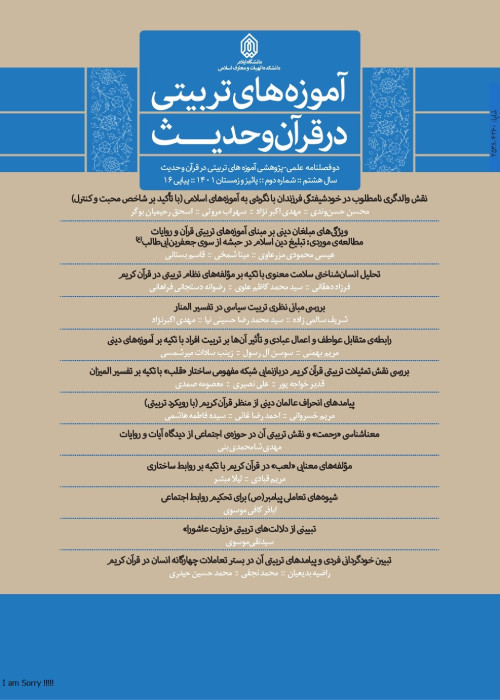Constructive and Destructive Criticisms and Their Role in Social Education from the Point of View of Nahj al-Balaghah; Grounds, Functions and Damages
Author(s):
Article Type:
Research/Original Article (دارای رتبه معتبر)
Abstract:
Abdolhadi Feghhizadeh[1]Mojtaba Mohammadi Anvigh[2]AbstractNarratives of Nahj al-Balaghah have been issued in various social and political situations and provide useful educational information to the readers. One of the issues discussed in Nahj al-Balaghah is the issue of criticism. From the point of view of Nahj al-Balaghah, various criticisms can be divided into two general categories: constructive/positive criticisms and destructive/negative criticisms. Based on the descriptive-analytical method, these criticisms have some special grounds to appear in society and their importance in social education cannot be denied. The most important areas of constructive criticisms according to Imam Ali (PBUH) in Nahj al-Balaghah are: Aware of weaknesses and corruption, acuity and comprehensiveness, thinking without prejudice, avoiding thoughtless emotions, and choosing social interests over individual and political interests; some grounds for destructive criticism include power-seeking and political competition, malignity, bias, crudeness, credulity, poisonous and crisis-ridden atmospheres, and avarice and narrow-mindedness. Additionally, constructive criticisms have the educational function of correcting weaknesses and distortions and bringing societies to intellectual and cultural maturity, creating some grounds for maximizing economic and social resources, strengthening social resources and empathy between rulers and people, and reducing flattery; as the most important educational damages of destructive criticisms are: loss of opportunities and destruction of individual and social capitals, prevention of the growth and prosperity of society, confusion of the atmosphere of society and the impossibility of distinguishing right from wrong, and disruption of social relations and weakening of brotherhood of faith. [1]. Professor at Tehran University[2]. Assistant Professor at Ilam University
Keywords:
Language:
Persian
Published:
Journal of Educational Doctrines in Quran and Hadith, Volume:8 Issue: 1, 2022
Pages:
1 to 20
magiran.com/p2562956
دانلود و مطالعه متن این مقاله با یکی از روشهای زیر امکان پذیر است:
اشتراک شخصی
با عضویت و پرداخت آنلاین حق اشتراک یکساله به مبلغ 1,390,000ريال میتوانید 70 عنوان مطلب دانلود کنید!
اشتراک سازمانی
به کتابخانه دانشگاه یا محل کار خود پیشنهاد کنید تا اشتراک سازمانی این پایگاه را برای دسترسی نامحدود همه کاربران به متن مطالب تهیه نمایند!
توجه!
- حق عضویت دریافتی صرف حمایت از نشریات عضو و نگهداری، تکمیل و توسعه مگیران میشود.
- پرداخت حق اشتراک و دانلود مقالات اجازه بازنشر آن در سایر رسانههای چاپی و دیجیتال را به کاربر نمیدهد.
In order to view content subscription is required
Personal subscription
Subscribe magiran.com for 70 € euros via PayPal and download 70 articles during a year.
Organization subscription
Please contact us to subscribe your university or library for unlimited access!


